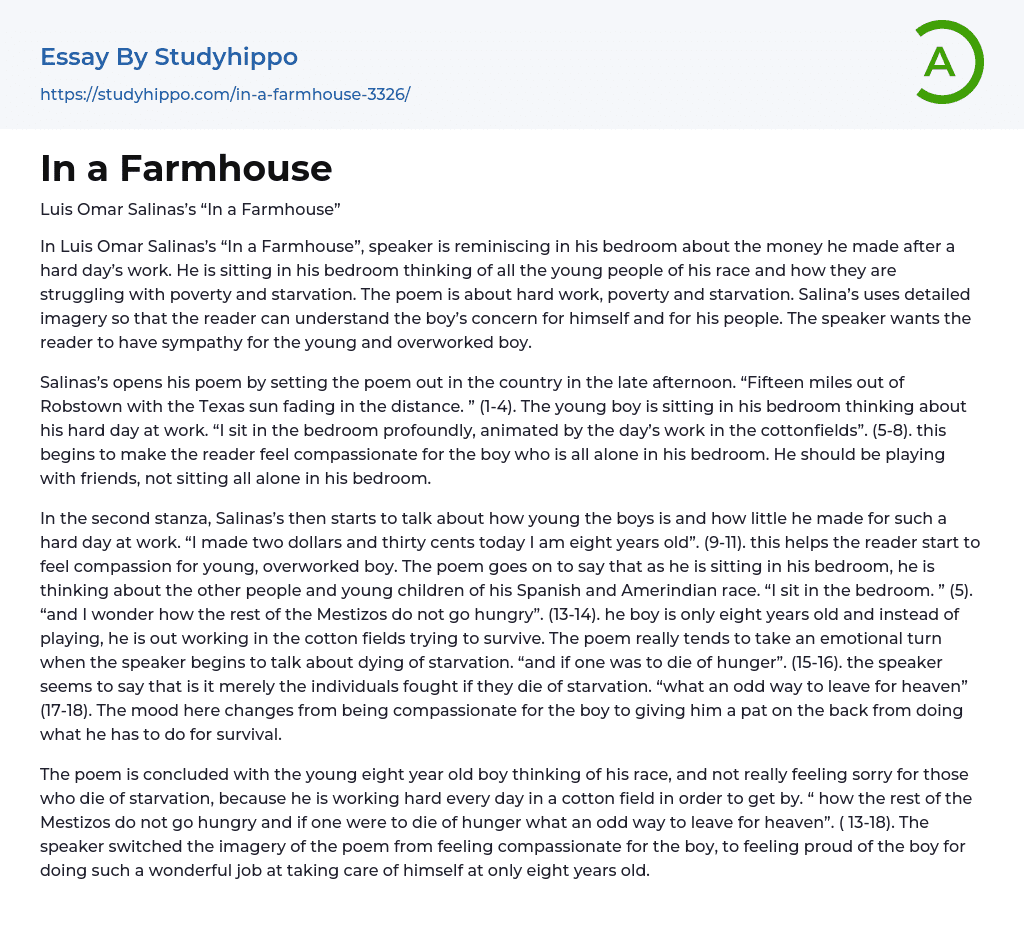Luis Omar Salinas’s “In a Farmhouse”
In Luis Omar Salinas’s “In a Farmhouse”, speaker is reminiscing in his bedroom about the money he made after a hard day’s work. He is sitting in his bedroom thinking of all the young people of his race and how they are struggling with poverty and starvation. The poem is about hard work, poverty and starvation. Salina’s uses detailed imagery so that the reader can understand the boy’s concern for himself and for his people. The speaker wants the reader to have sympathy for the young and overworked boy.
Salinas’s opens his poem by setting the poem out in the country in the late afternoon. “Fifteen miles out of Robstown with the Texas sun fading in the distance. ” (1-4). The young boy is sitting in his bedro
...om thinking about his hard day at work. “I sit in the bedroom profoundly, animated by the day’s work in the cottonfields”. (5-8). this begins to make the reader feel compassionate for the boy who is all alone in his bedroom. He should be playing with friends, not sitting all alone in his bedroom.
In the second stanza, Salinas’s then starts to talk about how young the boys is and how little he made for such a hard day at work. “I made two dollars and thirty cents today I am eight years old”. (9-11). this helps the reader start to feel compassion for young, overworked boy. The poem goes on to say that as he is sitting in his bedroom, he is thinking about the other people and young children of his Spanish and Amerindian race. “I sit in the bedroom. ” (5). “and
I wonder how the rest of the Mestizos do not go hungry”. (13-14). he boy is only eight years old and instead of playing, he is out working in the cotton fields trying to survive. The poem really tends to take an emotional turn when the speaker begins to talk about dying of starvation. “and if one was to die of hunger”. (15-16). the speaker seems to say that is it merely the individuals fought if they die of starvation. “what an odd way to leave for heaven” (17-18). The mood here changes from being compassionate for the boy to giving him a pat on the back from doing what he has to do for survival.
The poem is concluded with the young eight year old boy thinking of his race, and not really feeling sorry for those who die of starvation, because he is working hard every day in a cotton field in order to get by. “ how the rest of the Mestizos do not go hungry and if one were to die of hunger what an odd way to leave for heaven”. ( 13-18). The speaker switched the imagery of the poem from feeling compassionate for the boy, to feeling proud of the boy for doing such a wonderful job at taking care of himself at only eight years old.
- Cleaning essays
- Book Summary essays
- Metaphor essays
- Reader essays
- Rhyme essays
- Literary devices essays
- Villain essays
- Books essays
- Genre essays
- Literary Criticism essays
- Writer essays
- Protagonist essays
- Simile essays
- Poem essays
- Book Report essays
- Book Review essays
- Greek Mythology essays
- Plot essays
- Tragic Hero essays
- Coming of Age essays
- Play essays
- Rhetoric essays
- Rhetorical Question essays
- Translation essays
- Understanding essays
- Reason essays
- Character essays
- Letter essays
- American Literature essays
- Literature Review essays
- Utopia essays
- Poetry Analysis essays
- Dante's Inferno essays
- Between The World and Me essays
- Incidents in The Life of a Slave Girl essays
- Flowers for Algernon essays
- Myth essays
- Everyday Use essays
- Boo Radley essays
- Genesis essays
- Richard iii essays
- Alice in Wonderland essays
- On the road essays
- Ozymandias essays
- The Nightingale essays
- Holden Caulfield essays
- Animal Farm essays
- 1984 essays
- A Hanging essays
- Shooting An Elephant essays




